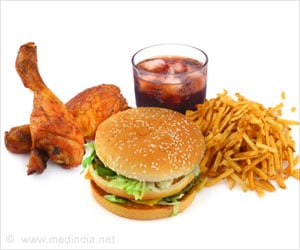A 10% increase in the intake of baked goods, sausages, fizzy drinks was associated with increases of 12% in the risk of overall cancer.
Highlights
- Cancer risk shoots up when the diet has more of ultra-processed food.
- Packaged baked goods and snacks, fizzy drinks, sugary cereals, ready meals and reconstituted meat products which have high levels of sugar, fat, and salt are ultra-processed foods.
- A 10% increase in the intake of baked goods, sausages, fizzy drinks was associated with increases of 12% in the risk of overall cancer. Ultra-processed or highly processed food in the diet can increase the risk of cancer in the years to come. Ultra-processed foods include packaged baked goods and snacks, fizzy drinks, sugary cereals, ready meals and reconstituted meat products - often containing high levels of sugar, fat, and salt, but lacking in vitamins and fiber . They are thought to account for up to 50% of total daily energy intake in several developed countries.
- A 10% increase in the proportion of ultra-processed foods in the diet was associated with increases of 12% in the risk of overall cancer and 11% in the risk of breast cancer.
- No significant association was found for prostate and colorectal cancers.
- There was no significant association between less processed foods (such as canned vegetables, cheeses, and freshly made unpackaged bread) and risk of cancer.
- Consumption of fruits, vegetables, pulses, rice, pasta, eggs, meat, fish and milk was associated with lower risks of overall cancer and breast cancer.
A team of researchers based in France and Brazil set out to evaluate potential associations between ultra-processed food intake and risk of overall cancer, as well as that of breast, prostate, and bowel (colorectal) cancers.
Data from 104,980 healthy French adults (22% men; 78% women) with an average age of 43 years was collected using two 24-hour online dietary questionnaires. The food intake included 3,300 different food items (NutriNet-Santé cohort study).
Processed Foods Linked To Cancer
Foods were grouped according to a degree of processing and cases of cancer were identified from participants' declarations validated by medical records and national databases over an average of five years.
"To our knowledge, this study is the first to investigate and highlight an increase in the risk of overall - and specifically breast - cancer associated with ultra-processed food intake," write the authors.
Martin Lajous and Adriana Monge based at the National Institute of Public Health in Mexico, say this study provides "an initial insight into a possible link between ultra-processed foods and cancer" but "we are a long way from understanding the full implications of food processing for health and wellbeing."
They point to several challenges, such as identifying the precise elements in ultra-processed foods that could lead to cancer, and the potential impact of other unmeasured factors on the results.
Source-Medindia
















